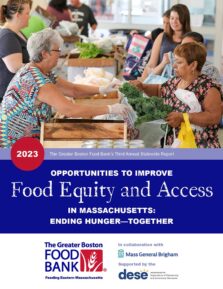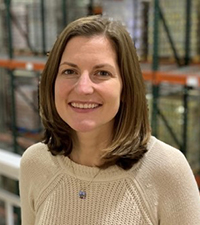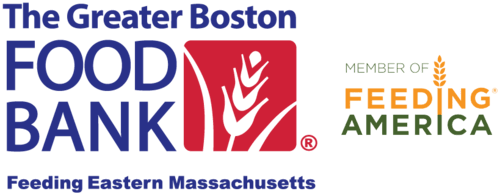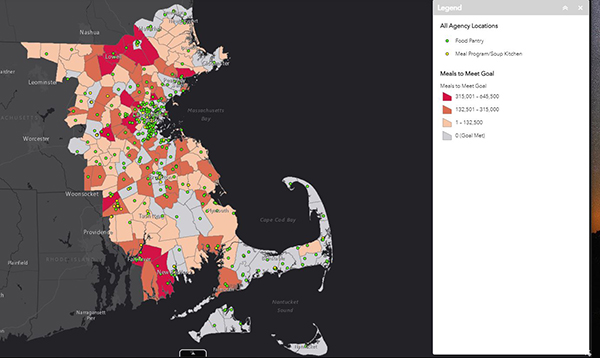The Greater Boston Food Bank (GBFB) conducts research and analyzes data on our operations, our network of hunger-relief partners, and our community in an effort to improve the effectiveness of how we feed our neighbors and improve public health in the Commonwealth. Our findings are used to guide GBFB’s strategy and to inform policy and advocacy at the local, state, and federal levels.
Closing the Meal Gap in Eastern Massachusetts
The map below features GBFB’s town-by-town progress toward our goal of distributing enough food to provide three meals per day for each food-insecure individual in Eastern Massachusetts.
Massachusetts Annual Statewide Survey on Food Insecurity, Equity & Access

GBFB has conducted annual research throughout the pandemic to examine the prevalence of food insecurity and the barriers to accessing food assistance programs. This is important to GBFB and our hunger-relief partners so that we are able to make data-driven, community-based investments and advance priorities that will have a real impact on the lives of our most vulnerable neighbors.
In 2023, GBFB conducted its third annual statewide food access study in Massachusetts in partnership with Mass General Brigham and with support from the Massachusetts Department of Elementary and Secondary Education (DESE) through a U.S. Department of Agriculture (USDA) grant. In previous years the research was generously funded by the Hunger to Health Collaboratory (H2HC) and Stop & Shop.
2023 Opportunities to Address Food Equity & Access in Massachusetts: Ending Hunger—Together Report
Survey Methodology
- GBFB conducted this statewide independent and anonymous survey of more than 3,000 Massachusetts adults by an online survey research firm, to examine the continued elevated levels of food insecurity
households face and their experiences with state and federal nutrition assistance programs. - The survey was originally adapted with the National Food Access and COVID Research Team (NFACT), a collaboration of researchers from 15 states. At the time, GBFB was only one of two food banks leading on statewide research.
- Over the last two years the survey has evolved with input from state, community, and healthcare partners, including our Health and Research Council. In previous years we measured food insecurity prevalence using USDA’s Six-Item Short Form Food Security Survey Module, and this year we measured using the full 18-item USDA Household Food Security Survey Module. New this year, we also looked at the severity of those who identified as food insecure.
- This survey included demographic quotas based on the American Community Survey from the Census Bureau for income, gender, race/ethnicity, age, education, and region to ensure we included representation of voices that are historically unheard.
- After the data was collected, our researcher collaborators at Mass General Brigham used a statistical weighting procedure to ensure our estimates were representative of the state’s population based on the Census Data.
For more information about the design, implementation and presentation of the survey, please read our survey toolkit.
Our Research Partners


Dr. Lauren Fiechtner, MPH
GBFB Health and Research Advisor; Director of Nutrition at Mass General for Children, Division of Gastroenterology and Nutrition
A leading expert in obesity and food insecurity, Lauren Fiechtner, MD, focuses her research on social determinants of health, fighting food insecurity, and improving access to food assistance programs. She is the director of the Center for Feeding and Nutrition at Mass General for Children and serves as the Senior Health and Research Advisor at GBFB. Under Lauren’s leadership, she brings the expertise to GBFB from Mass General Brigham’s research team under the Center for Healthy Weight and Nutrition Equity and partners on annual statewide research on food equity and access for Massachusetts. In addition to her work with GBFB, Dr. Fiechtner has led several controlled trials to treat childhood obesity in clinic and community settings.
Health and Research Council
The purpose of the Health and Research Council is to advise GBFB’s community-based research, programming, and policy work. GBFB relies on members of this Council to provide guidance on new developments and ideas in their relevant fields of expertise such as public health, public policy, and healthcare administration. Click here to learn about the members of GBFB’s Health and Research Council.
Our Publications
Food Equity & Access Reports (Prior Years)
2022 Opportunities for Food Equity & Access in Massachusetts Report
WATCH: A presentation on our “Gaps in Food Access in Massachusetts During COVID-19” report
2021 Gaps in Food Access Report
2021 Gaps in Food Access Report Appendix (Frequency Tables)
Racial/Ethnic Disparities in Food Pantry Use and Barriers in Massachusetts during the First Year of the COVID-19 Pandemic
We surveyed 2928 adults in Massachusetts regarding food access in the year before and during the first year of the pandemic. This study describes racial disparities in food insecurity, food pantry use, and barriers to and experiences with food pantries during the first year of the COVID-19 pandemic. Read more
An Overburdened Charitable Food System: Making the Case for Increased Government Support During the COVID-19 Crisis
Due to the COVID-19 pandemic, the number of people accessing our partner food pantry network doubled and our food distribution increased by 55%. Because of this increased need, GBFB is advocating for increased state and federal support for those facing food insecurity. Read more in our American Journal of Public Health editorial.
Health Center Program to Support Food Security Through Nutrition Coaching and Produce Markets (HC PRODUCE) Study
Since 2018, we have partnered with Cambridge Health Alliance to host a monthly produce distribution at the Cambridge Health Alliance Revere Care Center. Research is ongoing for quality improvement purposes and to evaluate the effectiveness of the program on improving diet. This work is funded in part by a SIREN grant and a Massachusetts Attorney General Office’s Social Determinants Partnership Grant.
As part of this collaboration, we have published:
- Food access initiatives: An integral piece of the Revere, Massachusetts, COVID-19 response (Journal of Agriculture, Food Systems, and Community Development)
- Participant Perceptions of a Free Fresh Produce Market at a Health Center(Journal of Nutrition Education and Behavior)
Health-Related Costs of Hunger
The Hunger to Health Collaboratory (H2HC) and Stop & Shop supported the first study of the health-related costs of hunger and food insecurity in Massachusetts. Conducted by Children’s HealthWatch, and released in 2018, the in-depth analysis reports hunger and food insecurity in our state increased health-related expenditures by an estimated $2.4 billion at least, in 2016 alone. For more on the intersection of food insecurity and health, see Food As Medicine: Rethinking Hunger Relief As Health Care (WBUR, 2017).
Additional Data & Research Resources
- MGH Revere Food Pantry: Addressing hunger & health at an academic medical center community clinic
- Map the Meal Gap study (Feeding America)
- Food Insecurity Projections during COVID-19 (Feeding America)
- Key Drivers to Improve Food Security and Health Outcomes (Feeding America)
- Analysis of Census Household Pulse Data (Northwestern’s Institute for Policy Research)
- Voices from the Field – A Case Study Series: Food is Medicine During COVID-19 (Food Is Medicine Massachusetts)
- Boston Indicators
Searching for more information?
Contact our Business and Data Analytics Team at data@gbfb.org.

